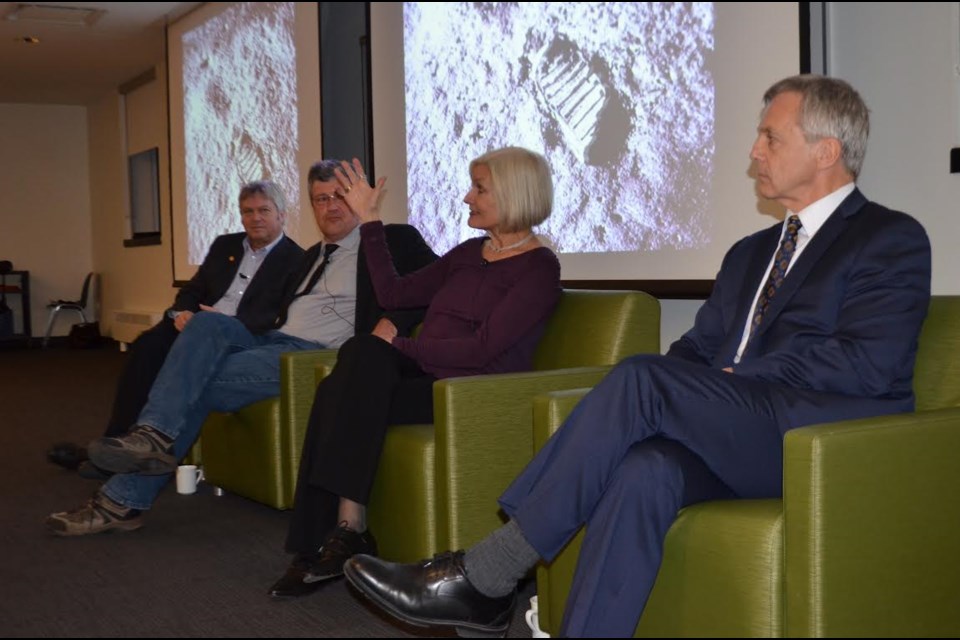University of Guelph scientists are leading much of the research that will prepare astronauts for the first mission to Mars.
While most of the scientific community supports the research there are some, such as NASA policy consultant Linda Billings, who believe rushing to put humans on Mars is irresponsible and even unethical.
“I wish we could put the brakes on all this talk about sending humans to Mars and other planetary bodies,” said Billings. “They keep coming up with another plan to send humans back to the moon and then on to Mars but we can’t do it. The money isn’t there and there are so many issues that have yet to be resolved.”
Billings joined a panel of researchers at the U of G last week to discuss the topic as part of the school's Derry Dialogues series.
The other panelists were Prof. Mike Dixon, Director of the Controlled Environment Systems Research Facility at the U of G; Prof. Ralf Gellert from the Department of Physics and the planetary research group at the U of G and Bob Thirsk, former astronaut with the Canadian Space Agency and Chancellor of University of Calgary
The question up for discussion was, “Why go to Mars?”
Billings said we should finish fully exploring Earth before we send humans to other planets and raised several other issues including her concerns about the ideologies of some of the primary advocates for colonizing Mars.
“They are in most cases avowed libertarians,” she said. “There is this idea that the individual’s rights supersede the rights of the group and that if an individual can get to Mars and build a house or start a mining operation that should be allowed without government regulation or interference.”
Bob Thirsk was a member of the Canadian Space Agency from 1984 to 2012 and was the first Canadian astronaut to spend an extended period on the International Space Station. He said he was inspired to become an astronaut by the idealism of US president John F. Kennedy.
“Kennedy said that we choose to go to the Moon not because it is easy but because it is hard and the effort will measure the best of our energies and our skills,” said Thirsk.
He is optimistic about sending humans to Mars in the not-so-distant future.
“I think we are ready to go to Mars,” he said. “Not tomorrow but I do anticipate by 2030-2035 we will be sending the first human expedition.”
He then went on to list the many physiological and psychological challenges astronauts on the 2.5-year mission will face. They include exposure to ionizing radiation, isolation, muscle atrophy, bone demineralization, boredom and stress.
“Everything about Mars is trying to kill us,” he said.
To survive for 2.5 years in space astronauts will need to grow their own food and developing plants that can grow in space is the focus of Dixon’s research.
“Most of you are probably not aware that that tiny little steel box behind the Bovey Building currently leads the world in that little niche field of biological life support – plants in space,” said Dixon. “If we are going to Mars for an extended period we absolutely must have green plants.”
Providing food is not the only role of the plants.
“If you grow enough food then the oxygen comes from the plants that photosynthesize the CO2 they scrub,” he said. “The fresh water they recycle is in excess of your life support requirements as a human.”
Water has been found on Mars thanks to researchers such as Gellert working with the APXS x-ray spectrometer attached to the Rovers Opportunity and Curiousity.
“We operate these rovers here with my team of grad students, post docs, faculty and colleagues in Guelph,” said Gellert. “We dial into operational meetings everyday where we decide what the rovers should do on this day and look at the data that has come down from the previous day. It is quite unique that you have this at a public university and not at a NASA centre behind a bunch of fences.”
The research not only helps us understand if life ever existed on Mars but how life started here on Earth.
“We simply don’t know therefore we use Mars as a time capsule to understand better the history of Earth, the history of life and what our position is in the universe,” he said.
